Activism has many forms. Some picture large protests in the streets, while
others see quiet moments of resistance—writing letters, making phone calls, or
simply choosing where to spend their money. In Alabama, where laws around
protesting can be strict, activism often requires creativity and persistence. So,
what does activism mean to you?
Taking It to the Streets: Protesting in Alabama - Protesting is one of the most
visible forms of activism. It brings like-minded people together, making their
voices heard in ways that demand attention. Alabama has laws that regulate
demonstrations, so permits are often required for public gatherings. Protesters
can face legal consequences if they block traffic or refuse to disperse when
ordered. Understanding these laws is crucial for ensuring that activism remains
both impactful and safe. Careful planning, including security measures and
awareness of potential risks, is essential to protect participants and maintain
the demonstration’s effectiveness.
While traditional protests can be powerful, they are just one piece of a larger
puzzle. Not everyone feels comfortable marching, but that doesn’t mean they
can’t be activists in their own way.
The Power of Letters and Calls - Never underestimate the impact of a
well-written letter or a persistent phone call! Contacting senators,
representatives, and local officials allows you to voice your concerns directly
to the people in power. Many politicians track constituent outreach, and large
numbers of calls or letters on a single issue can shift priorities. Attending city
hall meetings and speaking during public comment sessions is another direct
way to influence local policy.
Activism Through Spending. Money talks. Where you choose to spend—or
not spend—your money is a form of activism. Supporting businesses that align
with your values and avoiding those that don’t can make a real difference.
Many corporations respond to consumer demand, and widespread boycotts
have led to major policy changes. In a state like Alabama, where businesses
can hold strong political affiliations, mindful spending can be a powerful way to
push for change.
Activism isn’t one-size-fits-all. Whether you’re marching in the streets, making
phone calls, sending emails, attending city hall meetings, or voting with your
wallet, every action counts. The key is finding what activism means to you and
embracing it in a way that fits your life and values. Change happens when
people engage, and there’s no wrong way to take part.
How do you engage? What does activism look like in your life?



